Home-made slightly salted quick-eating dill cucumbers also called ogórki małosolne in Polish accompanied my entire childhood and reminds me of Summer months when baby cucumbers and overgrown flowering dill are in season.
Quick-eating slightly salted cucumbers are a bit different to regular pickled cucumbers (ogórki kiszone), they contain less salt in the brine therefore they ferment faster and have to be eaten within weeks while pickled gherkins, once the fermentation process is over, they can be transferred to jars, closed and stored.
Cucumbers in brine available in the stores are quite similar but those are much milder, crunchier, less salty and are ready to eat within 5 – 7 days of preparation. They do not require vinegar as preservative but use salted water solution that allow natural fermentation process.
Salted cucumbers are traditional Polish dish but I learnt that also other countries have similar marinated cucumbers recipes: Danish syltede agurker, Estonian soolakurgid or German salz-dill Gurken just to mention few.
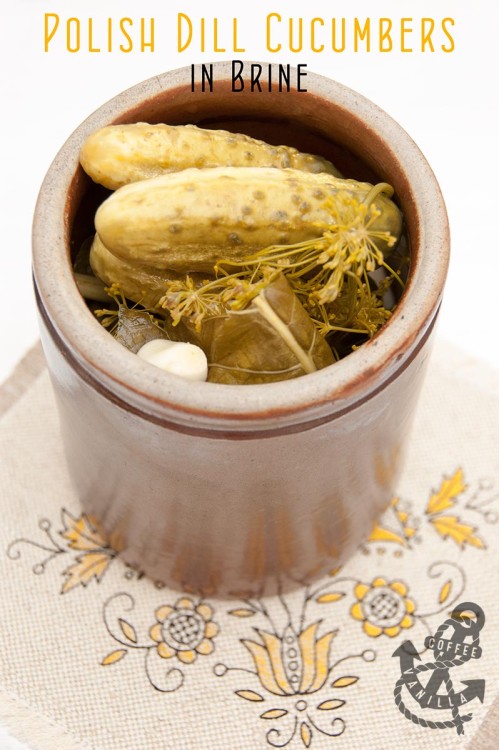
INGREDIENTS
- about 2½ kg baby cucumbers / garden cucumbers / pickling cucumbers
- about 3½ litres of boiled water
- about 5 tbs sea salt
- flowering / overgrown dill
- pieces of horseradish root
- horseradish leaves (blackcurrant, grape, cherry or oak leaves can be used here as well)
- garlic cloves (peeled)
- peppercorns – optional
- mustard seeds – optional
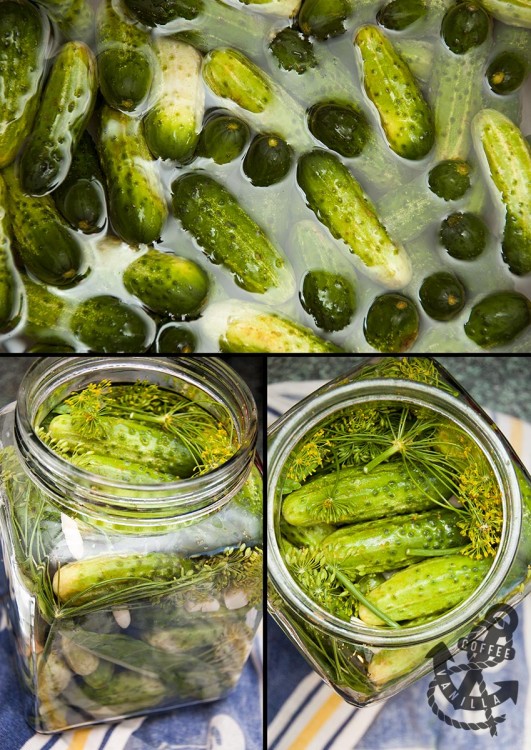
EQUIPMENT
- 2 large glass jars / pickling jars, ceramic crock pot or special fermentation crock (we used one large 4 litre jar and one 1,5 litre crock pot dish)
- heavy plates or smaller jars filled with water to cover the pickling containers and prevent cucumbers from floating
- plates or trays to put under the dishes with cucumbers
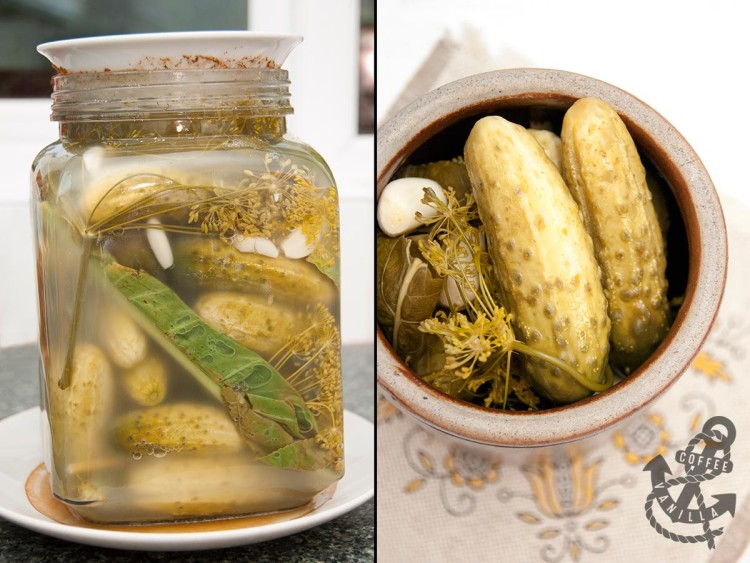
METHOD
- Start by washing and soaking cucumbers in water for couple of hours.
- In meantime dissolve salt in boiled water, leave aside to cool down.
- Cover bottom of the jars or crock pots with some leaves and dill stems.
- Layer cumbers and seasonings trying to arrange them in containers as tight as possible to prevent them from floating once water is added.
- Pour over cooled down salted water.
- Cover containers with plates and place on some bigger plates or trays as the cucumbers will start fermenting and bubbling spilling some of the brine outside of the jars.
- Let the cucumbers to ferment for at least 4 – 5 days.
- When cucumber reach desired saltiness and sourness (constant tasting is required) move the container to the fridge to slow down the process.
- Enjoy sliced on sandwiches, in salads, burgers and hot dogs or quartered lengthwise as a side dish.
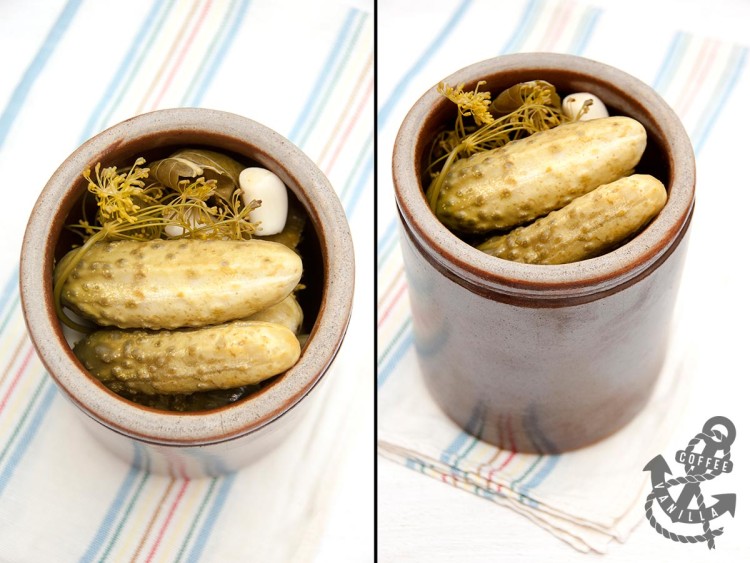
NOTES
Leaves prevent cucumbers from getting soggy in the water solution so it is important to include them.
While washing cucumbers pay attention to those that are floating on the surface, they are probably hollow inside and therefore are not the best for pickling.
Avoid using plastic containers, unless they are food grade.
To make standard pickled cucumbers (ogórki kiszone) rather than quick-eating ones (ogórki małosone) increase amount of salt in the brine to at least 2 – 3 tbs per litre of water.
If you are looking for more home-made pickles recipes, check out those Hot Mexican Pickles from Supper in the Suburbs or Spiced Fermented Carrot Salad from Natural Kitchen Adventures.
I’m submitting this recipe to Ren’s Simple & In Season.
I’m adding it also to the Inheritance Recipes challenge that we have just started together with Solange of Pebble Soup. This month theme is Cool Recipes so please come and join us, share your inherited Summer recipes!
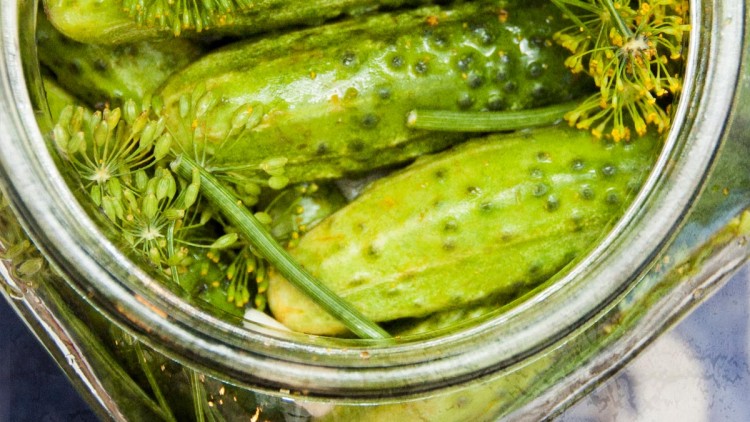


Oh my – I love those pickles. This is what we call a pickle, or a “dill pickle” in Canada. So nice & crunchie. I still have no idea what pickle atually is here in the UK, but it’s not these. I miss these in the UK and didn’t think I’d be able to buy the baby cucumbers to make them. Where can you buy the cucumbers to make them here? My mom’s recipe is very similar – but without the leaves. Thank you so muc for posting this – I’d love to be able to make some!
Just go to a polish shop and buy ogorkis!
They have all the ogorkis.
Even Asda had a polish section now, the bandwagon jumping gits.
These look great. I tried fermenting cucumbers before, but over a longer period. Love the gherkin like taste you end up with and all that strong flavour of dill!
Andrea – those are my mum’s cucumbers from Poland but baby cucumbers like this are sometimes available on the farmers’ markets during Summer months here in UK. Leaves prevent cucumbers skin from getting too soft… not sure exactly how, it is a chemical thing, but it works.
Ceri – if you add more salt and leave them for longer you will get proper gherkins, those are much milder and still half raw… my favourite! :)
I am a huge fan of pickles in all shapes and sizes. These look fantastic. The photos are stunning. I just want to reach out and grab one!!!
PS. Thanks for the mention ;-)
Emma – no problem at all. Thank you soooo much for the complements!
I love dill pickles and I bet home made ones taste absolutely fabulous:-) I have to admit I have never pickled anything but I remember my Danish grandmother’s cellar was full of pickled vegetables!
This looks delicious. Have never thought of pickling cucumbers before
These look fantastic – and Nick would love them! He is growing some cucumbers on the allotment at the moment so I am definitely passing this recipe along :)
OOoh these sound amazing! I want to jump into the pictures and start eating – yum! I’m a pickle fan, you see! Bookmarked!
Looks fabulous. I have never ventured to make pickles but I am feeling the itch this year. You make it look so easy.
These salted, Dill cucumbers are fantastic. Last year I pickled over 10 kilos of gherkins, and it just disappeared over the months. However I have made a new batch this season..I still can’t get enough of it. Thanks to the Polish for inventing such a lovely pickle. This recipe is fantastic!
Looks like a recipe I’ll try this year. I have a large crock so it will be pretty easy. It is close to the recipe I use to make dills. I usually put them in jars and water bath them after they get to the taste I want.
The water bath sounds like a good idea. I did not make enough last time to put away for later, but I may try it next time. Thanks for the tip Jakub! :)
How long do they last after they’re made?
I’m looking for a preservation method that doesn’t need pickling strength vinegar (very strong, but safe) and doesn’t need refrigeration.
And it needs to be safe for long term (until I eat them all) storage outside of a fridge.
Fermentation does seem to be the key.
This my first try with these pickles. I followed the recipe exactly it has been 7 days I cut one and it is still white insideThey are fermenting well there is some grey
/white scum on the surface….is that normal? Should I leave them longer?
They smell good. Please advise if you can.